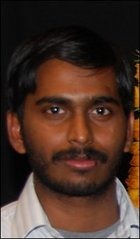A perusal of the leaked UN report would show that the outlook is to ultimately save the Sri Lankan state by providing it with an escape avenue through a minimum penalty of accepting a ‘concurrent’ international mechanism to investigate the war crimes. But the reactions coming from Colombo only show that such an undue consideration on the part of the UN and the IC towards Sri Lanka is futile as state has never been orientated in the island for peaceful unity or for being genocide-free. Perhaps a chance has now been given especially to the Sinhala masses to demonstrate their choice between supporting a criminal regime that tries to save its skin by citing love to a genocidal `mother country´ and recognizing the love of both the Sinhalese and Eezham Tamils towards their mother countries in order to pave way for true reconciliation, writes A. Vijayshankar of Tamil Nadu who is now in Norway.
 Mr. Vijayshankar Asokan, 27, comes from Dharmapuri District of Tamil Nadu. He is currently a Ph D research fellow in Physics in the University of Bergen, Norway. He is also an elected member representing Bergen region in the Norwegian Council of Eezham Tamils.
Mr. Vijayshankar Asokan, 27, comes from Dharmapuri District of Tamil Nadu. He is currently a Ph D research fellow in Physics in the University of Bergen, Norway. He is also an elected member representing Bergen region in the Norwegian Council of Eezham Tamils.
The following are further comments of him on the UN panel report:
Appreciation comes right across the world for the UN panel report that has called for a concurrent international mechanism to investigate the war crimes in the island. The report is in fact first of its kind coming from the international community towards the decades-old affairs in the island.
“The conduct of the war represented a grave assault on the entire regime of international law designed to protect individual dignity during both war and peace,” says the recommendations of the UN Panel in its executive summary.
But the UN is yet to recognize that what took place and what is taking place in the island has to be investigated for the genocide part.
The kind of genocide carried out in the island over the past several decades and being carried out even now, is more than enough for direct international action to liberate the affected nation of Eezham Tamils from the Sri Lankan state.
Last year, the Permanent Peoples’ Tribunal (PPT), an international opinion tribunal independent from any State authority, after examining the evidences and hearing eyewitness accounts in Dublin, between 14 -16 January, not only concluded that the GoSL had committed war crimes and crimes against humanity, but also acknowledged the importance of continuing investigation into the possibility of genocide.
While the UN Panel Report sounds approaching the conflict and remedies within the framework of Sri Lankan state, the Dublin report clearly implied that the conflict had an international character and sought an international response.
The Dublin Tribunal has also raised the question of the international role in the disruption of the 2002 Ceasefire Agreement (CFA). Further, the Tribunal has also recognized the ex-compatants detained in Sri Lankan prisons and undeclared locations and numbering more than 12,000, as political prisoners.
Citations from the leaked UN Panel Report appearing in the media tell that a crime on the part of the LTTE was that it kept civilians in its fold when it was clear that the war was lost. On the contrary, there are reports, some even coming from the side of Colombo that hopes were there about a last minute evacuation. If so, the ´crime´ needs to be investigated from another angle.
Diaspora’s refusal to accept the crimes of the LTTE is another point cited in the panel report as hindrance to peace. When was the diaspora provided with an opportunity to assess the politics of its nation in an environment free from unjustifiable support to state terrorism? Unbalanced attack on the Eezham Tamil diaspora only encourages decisions such as the deportation of the 74-year old widow of the assassinated TNA parliamentarian Joseph Pararajasingham.
Sri Lanka is a country where a Sinhala-Buddhist chief of the caliber of the prelate of the Asgiriya Chapter sees the war as a humanitarian operation and claims of human rights violations were unacceptable (Daily Mirror, Monday).
In another opinion found in the leaked panel report, extremism on both sides in an ethno-national question is viewed as a hindrance to reconciliation. Equating those who want independence and those who refuse it indirectly amounts to saving and justifying the existing state.
The UN panel report in some instances sounds like the ICG position, elucidated by its CEO last October and by its Sri Lanka project director in March this year, as well as sounds like the paradigm of ‘reconciliation’ coming from the US Asst Secretary of State Robert Blake.
The ICG position was not looking into the merit of the current national questions but was looking into the geopolitical contexts for supporting and rejecting independence. Thus there were some instances where independence was foregone conclusion, no comments on some instances and blatant refusal for others like the Eezham Tamils.
Even when there is such a foul ‘support’ for the Sri Lankan state, Mahinda Rajapaksa wails and blackmails when there is a simple call from the international community for basic accountability in war crimes. The world watching him should realize that with what ferocity and frenzy the Eezham Tamils must have been facing chauvinism in the island.
People in the island, especially the Eezham Tamils, have seen enough of corpses. Nobody wishes to see another on the electric chair. Let Rajapaksa, hale and healthy, have his beloved mother country, but let him get out of the mother country of Eezham Tamils.
(For updates you can share with your friends, follow TNN on Facebook and Twitter )
